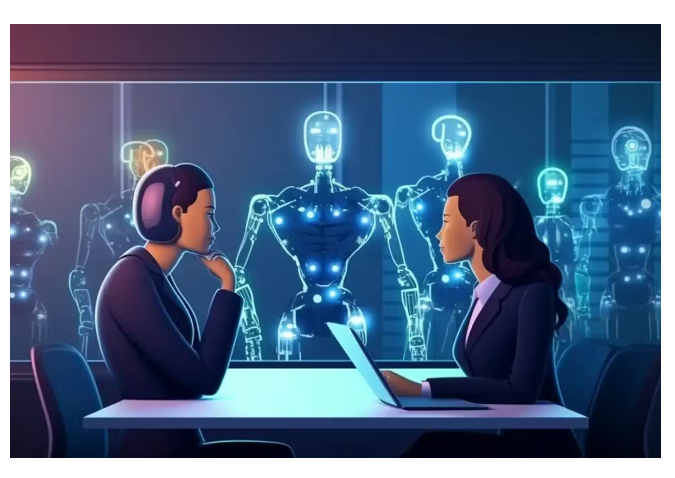
AI is set to revamp the HR sector just as it is anticipated to make a detour in the operations of the existing industries, transforming how professionals handle various tasks and responsibilities. By integrating AI tools, HR departments can streamline their processes, making them more efficient and effective. Let’s explore the AI tools developed by our company, the challenges in implementing AI in HR, and the essential skills HR professionals need to stay relevant in this rampantly changing infrastructure.
Innovative AI Tools for HR
Our company has developed several AI tools designed to maximize HR productivity and streamline processes. These tools include:
- Automated Resume Prescreening: This tool adeptly screens resumes, matches candidates with job requirements, and schedules interviews, considerably reducing the time HR professionals spend on these tasks. This allows them to focus on strategic activities, such as building relationships with potential candidates and improving the overall hiring process.
- Predictive Analytics: By analyzing workforce data, this tool identifies patterns and predicts future needs, helping HR managers proactively address employee turnover, skills gaps, and workforce planning. This data-driven approach enables more informed decision-making and better resource allocation.
- AI-driven Chatbots: These chatbots gather candidate information, conduct preliminary pre-screenings, and filter out applicants without recruiter involvement. They provide immediate support and answers to common HR questions, reducing the workload on HR professionals and improving efficacy in the hiring process.
These AI tools are unique because they offer comprehensive solutions that cover various HR functions, from recruitment to employee management. By automating routine tasks and providing valuable insights, our AI tools enable HR professionals to focus on strategic initiatives that drive organizational success.
Challenges and Concerns
While AI offers an edge in burning the bridges between efficiency and time investment, its implementation in HR comes with considerable challenges and concerns:
- Bias and Ethical Issues: AI systems can perpetuate existing biases if trained on biased data. Ensuring AI algorithms are fair and unbiased is crucial to prevent discrimination and promote diversity in the workplace.
- Lack of Human Touch: Certain HR functions, such as performance reviews and disciplinary actions, require empathy and understanding. AI cannot replace the human touch needed in these interactions, which is vital for maintaining employee morale and trust.
- Cost and Investment: Implementing AI in HR can be expensive, requiring highly stipulated investments in technology and training. Organizations need to carefully consider the cost-benefit ratio and ensure they have the necessary resources for a successful AI integration.
- Data Security and Privacy: With AI handling sensitive employee data, ensuring data security and privacy is at the forefront. Organizations must implement robust security measures to mitigate data breaches and misuse.
Staying Relevant in the Age of AI
HR professionals can stay relevant by imbibing the habit of continuous learning and digital curiosity as the development of technology can be construed as unpredictable and constantly growing. Here are some key areas to focus on:
- Digital Literacy and AI Understanding: HR professionals should familiarize themselves with AI technologies and understand their practical applications. This includes learning about AI ethics, data analysis, and how AI can be integrated into HR processes.
- Strategic Thinking and Innovation: As AI takes over routine tasks, HR professionals need to focus on strategic initiatives that require human insight and creativity. This includes developing HR strategies aligned with business goals and identifying new opportunities for organizational growth.
- Interpersonal and Communication Skills: Despite the rise of AI, human interaction remains crucial in HR. Professionals should enhance their communication, leadership, and relationship-building skills to effectively manage and support employees.
- Adaptability and Flexibility: The rapid pace of technological change requires HR professionals to be adaptable and open to new ways of working. This includes being proactive in adopting new technologies and methods to stay ahead in the industry.
- Continuous Learning and Development: HR professionals should commit to lifelong learning, staying updated on industry trends and advancements in AI. This can be achieved through attending workshops, online courses, and participating in professional networks.
The bottom line is AI is adding revolutionizing layers to the HR sector by automating routine tasks, providing valuable insights, and enhancing employee experiences. While there are challenges that need to be conceived, HR professionals can stay relevant by developing new skills, embracing innovation, and focusing on strategic initiatives that drive organizational success. By balancing the use of AI with the essential human touch, HR can continue to play a vital role in shaping the future of work.
Garima Maheshwari is the CFO of Modern Masti Private Limited.















